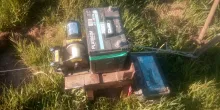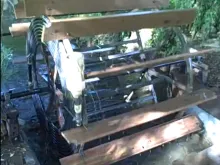Traveling sprinkler
My UPDATED homestead-info gateway
I started a Pinterest board concerned with rural "methods, tools, and equipment,” and it’s currently updated to edge toward 1000 practical-site links. The "pins" (descriptive entries with pics) link to sites explaining methods, technologies, repurposing options, and tips of potential value to small farms and to homesteads.
 https://www.pinterest.ca/joelbc/homestead-methods-tools-equipment/
https://www.pinterest.ca/joelbc/homestead-methods-tools-equipment/
- Read more about My UPDATED homestead-info gateway
- Log in or register to post comments
Wise Orchard: smart urban garden and orchard irrigation timer
solar irrigation technique used
If irrigation work automatically by the help of sun than its so fantastic. For example: in which area no water on field Irrigation system automatically detect and working according.
- Read more about solar irrigation technique used
- Log in or register to post comments
Water flow warning light
Irrigation Pump
Hi! I have been consumed with this problem and haven't been able to find a solution. I am looking to build a rather inexpensive solar irrigation pump that can draw water out from depths of about 500 ft. I wanna combine this pump with drip irrigation. I'd like to use it for my farm in India. Looked into buying one but companies selling such pumps are super expensive. Anyone here have any experience with solar irrigation submersible pumps? Any help would be greatly appreciated.
- Read more about Irrigation Pump
- Log in or register to post comments
Horto domi - RobotGardener
Irrigation
I recently read a book, Botany for Gardners. In it I found information on how much a corn plant typical transpires in a given season. This got me to thinking about other plants. The book stated that a single corn plant will transpire 55 gallons of water throughout a growing season. In other words, seedling to harvest. In a typical growing season of 130 days, that translates to about 2.4 gal/day. Seems like a lot of water. Does anyone know if this kind of information exists for other plants?
- Read more about Irrigation
- Log in or register to post comments





